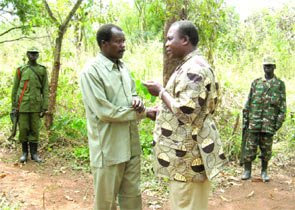
Dr.James Obita
Government forgives top Kony rebel
Tuesday, 5th August, 2008
Dr. James Alfred Obita
By Milton Olupot and Charles Ariko
THE former leader of the LRA peace team in Juba, Dr. James Alfred Obita, was yesterday granted amnesty after 22 years of fighting the Government.
Obita said he returned because he believed in what the Juba peace agreement had achieved.
“After the peace talks, I thought I would set an example. My returning is not a betrayal (of the LRA cause). It is time to come back home,” he said.
Together with five others, two men and three women of the Allied Democratic Forces (ADF), Obita received his amnesty certificate from the chairman of the Amnesty Commission, Justice Peter Onega, at the commission headquarters in Kampala.
The former ADF fighters included Silver Mumbere, Fatuma Nakajubi, Hanifa Nalukwago, Sularia Nakimera and Abdlazak Bassajja. They looked well nourished and smartly dressed.
Obita raised the number of LRA rebels who have benefited from the amnesty to 12,841, since the establishment of the Amnesty Commission in 2000. A total of 22,921 fighters from various rebel groups have benefited from the amnesty.
“My word to you is that you are welcome back to Uganda. Help us convince the others to come back home. The choice you have made is a correct one. Wherever you go, home will always be the best,” Onega told the six former rebels.
Onega, flanked by commissioners Ganyana Miiro, Thomas Kisembo and Grace Ociiti, explained that the amnesty exonerates them from any crimes they committed during the rebellion.
“I have always said this country is ours and everybody has a right to live here. If we have any problems, we can solve them here. I can assure you that after the grant of amnesty, you will be free people. Feel free and you are welcome to start life afresh,” he said.
A beaming Obita, clad in a grey, striped suit, commended the commission and pledged to work with Onega to help woo LRA fighters out of the jungles and end the 22-year-long war that has ravaged the north and eastern parts of the country.
“I will use my presence here to convince those still in the bush to return home. I will be the commission’s ambassador,” he said.
He added that the commission should be strengthened and facilitated to look after returnees.
The six received packages, including a mattress, jerrycan, two saucepans, a plastic cup and plate, a hoe, packets of beans and maize seeds and sh263,000 each.
Obita said President Yoweri Museveni had directed the internal affairs permanent secretary to help him recover $2m (about sh3.5b) that he lost when the Government froze his Uganda Commercial Bank account in 1987.
Obita said he was convinced that the Juba agreement was good and achieved what the guns could not achieve. He blamed some Ugandans both at home and in the Diaspora for misleading the LRA leader, Joseph Kony, not to sign the final peace agreement.
Obita said he wanted “to sort” himself out shortly before he could travel to his home district of Kitgum.
Commenting on the LRA former commanders, who returned through the DR Congo and are reportedly still held by security agencies, Onega said after receiving amnesty, there was no justification for detaining the former rebels.
“We were surprised when we received the information that some of these ex-rebels were being kept by security agencies. If you receive amnesty, that means you are free. If there are any other charges then they should be taken to court. Let this not confuse the public that when you get amnesty, you get detained.”
Who is Obita?
- Obita has been with the LRA for the last 22 years.
- He worked for the external wing of the LRA, based in Nairobi and London.
- Was the LRA spokesperson in the mid-nineties and later secretary for external affairs and mobilisation.
- In 1988, he fell out with LRA chief Joseph Kony, who accused him of trying to make money out of the LRA cause.
- Was re-appointed as technical adviser to the LRA peace team in Juba in 2006.
- Obita replaced David Matsanga as chairman of the LRA team in Juba on April 10 2008.
- He applied for amnesty in July 2008.




















